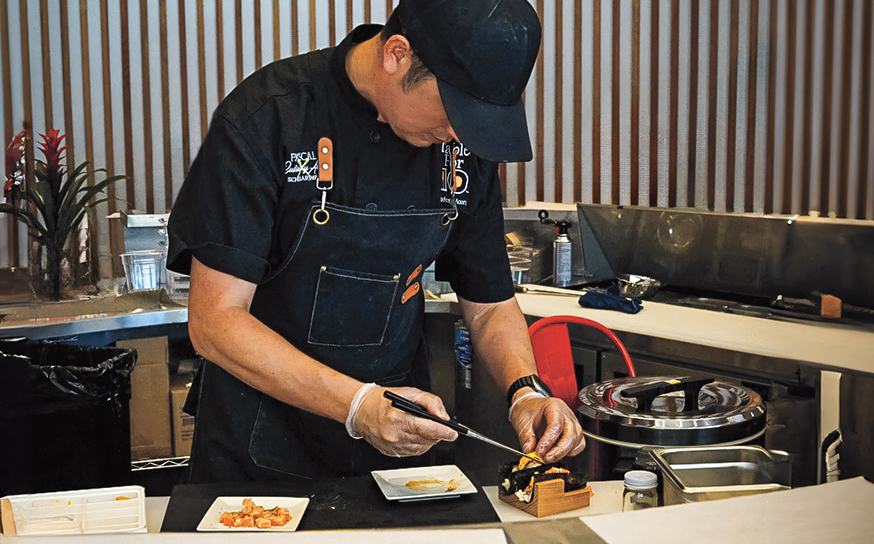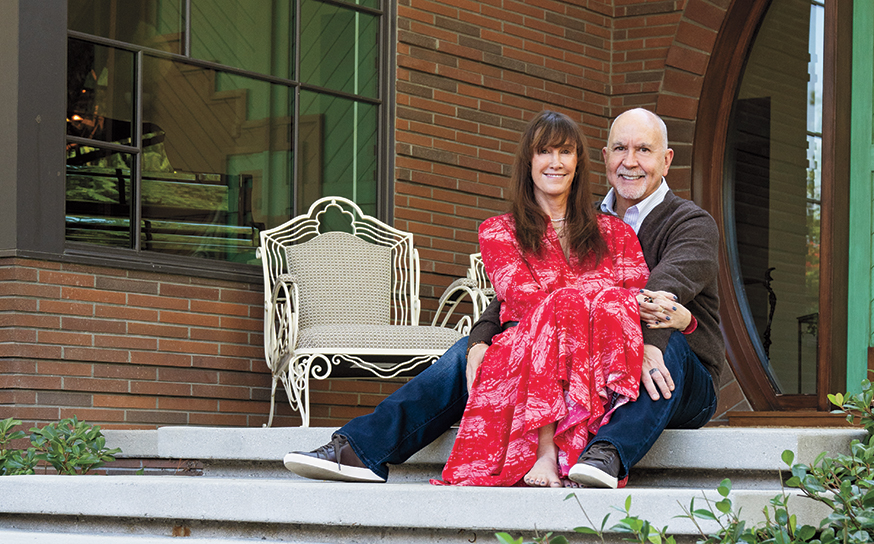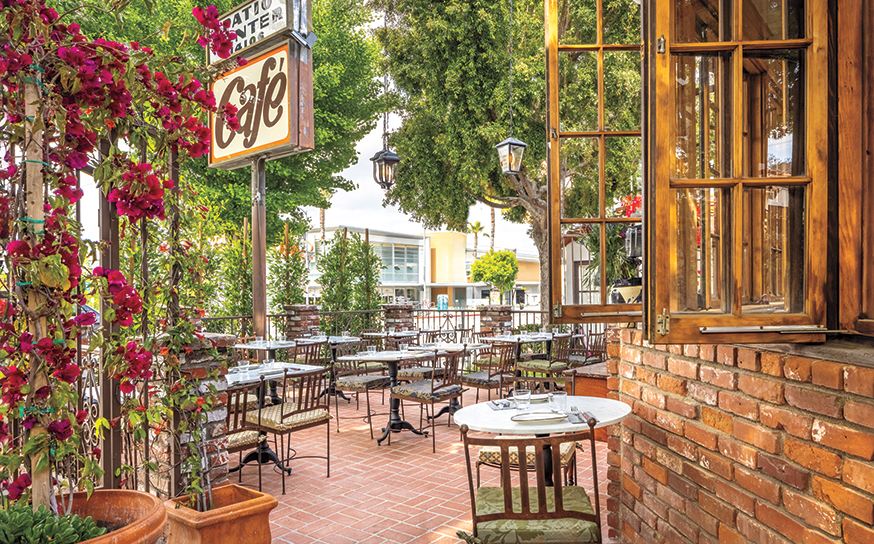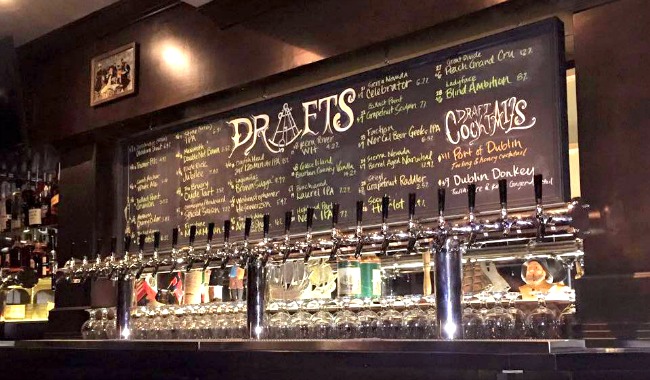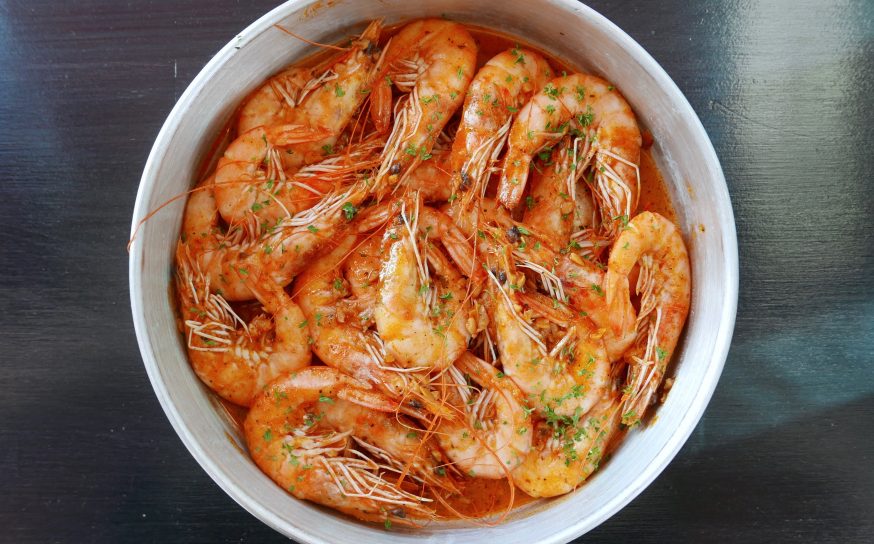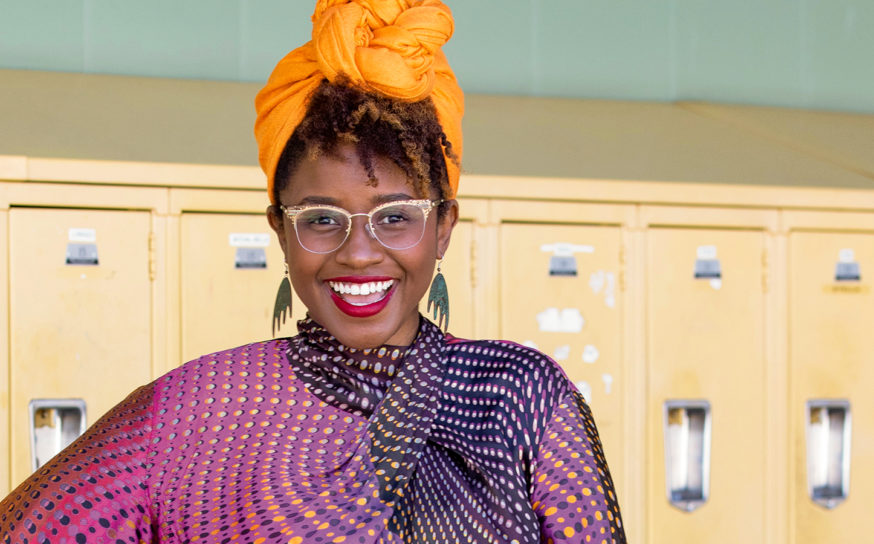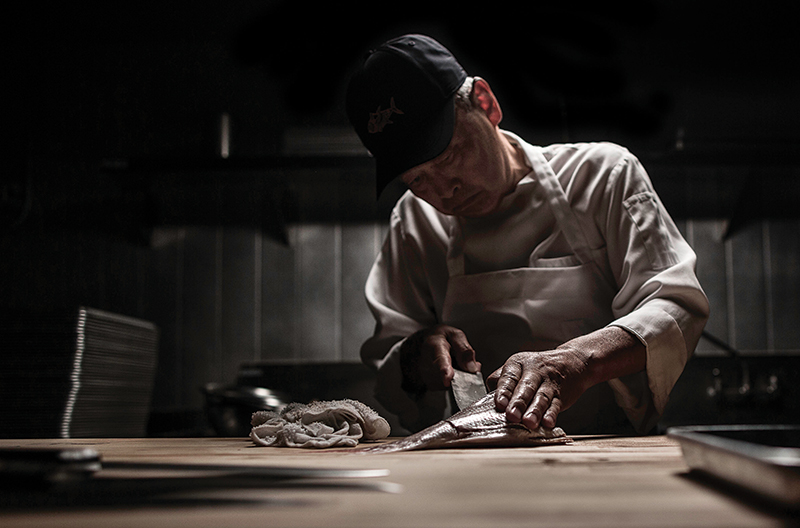
Raw Talent
A revealing profile of stubborn but talented Kazunori Nozawa—the chef who carved the path for the Valley’s renowned Sushi Row
-
CategoryEat & Drink, People
-
Written byKaren Young
Hard to believe, but nearly three decades ago Ventura Boulevard—around Laurel Canyon, the area currently jam-packed with busy restaurants—was a no-man’s-land. There was a sprinkling of middling eateries and stores mixed with occasional auto shops … until one man made a mark.
An immigrant to the U.S., he possessed invaluable knowledge brought with him from Japan: how to select raw, superior fish and, with very few other ingredients, transform it into mouthwateringly delectable sushi. His name is Kazunori Nozawa. And his story is the American dream.
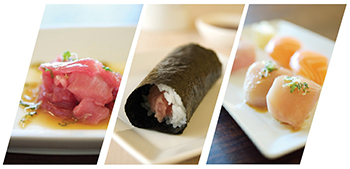
The chef became famous—not just for his sushi, which inspired many of the dishes we now see throughout LA, but for his obstinate, often called “tyrannical,” passionate personality. His restaurant, Sushi Nozawa, was situated in a nondescript strip mall before doing that became chic. Diners at the bar forewent the option of ordering, instead eating whatever he put in front of them. This unusual approach defied the odds, and Sushi Nozawa thrived for 25 years.
Frank Leon opened La Loggia in Studio City around a year before Sushi Nozawa. The longtime restaurateur credits the chef as a pioneer who was instrumental in bringing Westside “foodies” to the Valley when the area did not have that much to offer. “At first the biggest attraction was for those in show business, and then the rest followed,” he says.
Frank reminisces about the first time he dined at Sushi Nozawa. “I had heard that this guy was really strict, but my friend and I decided to see for ourselves. We asked for a bowl of rice, and he immediately kicked us to a table from the sushi bar … but we still came back.”
Now, 2½ years after closing his namesake restaurant, Nozawa is still known as the “sushi Nazi”—a nickname he adamantly rebuffs. “I am not the sushi Nazi. That is a terrible phrase, and I wish it was never used. I worked very hard to give my customers the best that I had. Every day. Sometimes a customer would disrespect other customers … or me … or my wife. When a customer intended to disrupt things, I would let the person know it was time to leave.”
Nozawa, now 70, insists that it was all just part of his work persona. “Working to perfect my sushi requires me to be very focused. Outside of the sushi bar, I am very different—I’m much more relaxed. I spend a lot of time with my dogs. My wife and I cook together often, laugh a lot, and we love to go out to eat at places all over town. When I have the time, I love to golf.”
SHARPENING HIS KNIVES
Chef Nozawa first started cutting sushi at the age of 18 after spending three years apprenticing at one of the top restaurants in Tokyo. He followed the strict, mandatory progression before a sushi chef apprentice is allowed to cut his first fish, learning everything from honing knives to preparing rice. He made deliveries, washed dishes and cleaned the kitchen. Most importantly, he learned how to prepare the fish—first making sushi rolls and then nigiri.
Nozawa says he went to the fish market with the master chef whenever he could to learn what is considered an art in sushi-making: selecting the best fish. Next he took a journey, traveling around the country for five years.
“I spent a few months in each province to learn and master the proper techniques for cutting many different kinds of fish. I wanted to learn everything. My master chef would always say, ‘No stringy, no chewy, no tough,’” he recalls.
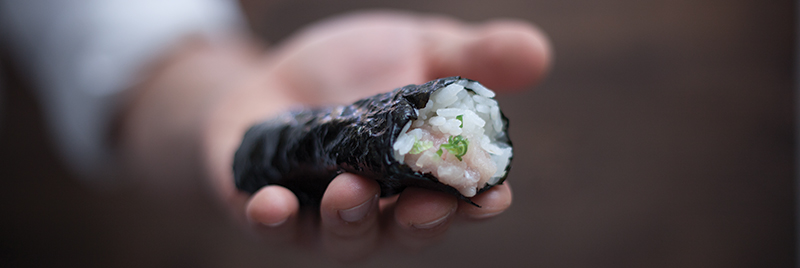
FAMILY DINNER One of Nozawa’s hand rolls.
While owning a sushi restaurant with his mother in an affluent neighborhood in Tokyo, he submitted a request through a professional organization to relocate to America. It was approved, and Nozawa knew it was an opportunity not to pass up. He landed in Los Angeles in June 1978, first working at Asuka in Westwood.
“I remember being very impressed by how well the chefs spoke English, but I was surprised by their lack of sushi-making skills, or maybe it was just that the sushi that they served was so far away from my classic training. The fancy rolls and rolls with rice on the outside felt inauthentic, but people still seemed to enjoy the food,” he says.
After working in several LA restaurants, Nozawa says he realized he had a calling to “educate Americans about the principles of omakase and traditional sushi.” Bored with California rolls and spicy tuna rolls, which at the time were what most people ordered, the chef set out to fulfill his dream of serving authentic, simple sushi in his own restaurant.
THE DAWN OF SUSHI IN THE VALLEY
In 1987 at the age of 42, he opened Sushi Nozawa on Ventura Boulevard in Studio City. Sushi was gaining popularity in LA, but there were only a handful of sushi restaurants here, including Teru Sushi, Bizen and Iroha (the Michelin-starred Asenabo opened after Sushi Nozawa).
“It was an exciting time and one of the proudest and most nerve-wracking moments of my life. I knew that I wanted to serve traditional sushi, even though most all of my friends told me that no one would be interested. In fact, most of my closest friends tried to dissuade me from opening Sushi Nozawa. I didn’t listen.
Sometimes it’s good to be stubborn,” he declares.
Nozawa, who describes himself as a purist, has a strict definition of traditional sushi. “I believe in fish, rice and just the right seasoning to bring out the flavors of the fish. When warm, loose rice is combined with the right fish, it just melts in your mouth.”
Sushi Nozawa wasn’t an overnight sensation. He says it took “more than six months of standing behind the bar with an empty restaurant to fill the chairs, but once people started coming, they didn’t stop.”
From the beginning, the mantra at his 25-seat restaurant was “Trust Me” (omakase—chef’s choice), which was made clear by a
variety of dedicated signs on the wall. And he had rules. Every person who took a seat had to order food and not bother other guests (there was a “no cell phone” sign in later years). There was no takeout, extra sauces or bowls of rice.
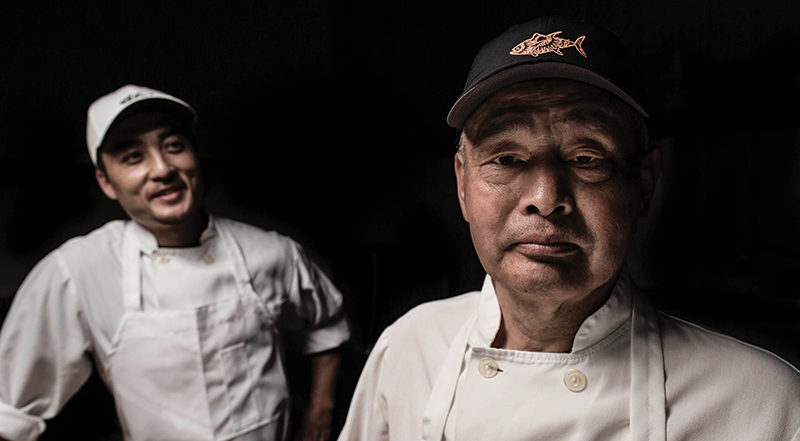
The chef with his son, Tom.
“As a chef, I think those are good rules. When I eat at someone else’s place, I follow the rules they set,” he says. “Usually the biggest issue was people sitting at the bar and asking for something other than chef’s choice.” Nozawa states unapologetically, “We had the table seats for that.”
Although the restaurant had stellar Zagat ratings, not everyone was a fan. In 2001 Los Angeles Times’ S. Irene Virbila called Sushi Nozawa one of the “most overrated restaurants in Southern California.” Pulitzer Prize-winning Los Angeles Times food critic Jonathan Gold, who touted Nozawa’s virtues in 1988 as “a genius of simplicity,” has since written that much of what Nozawa prepared “in the last few years of his run became rote: assembly-line sushi dealt out like blackjack hands.”
But diners, who ventured to the Valley from all over LA and beyond, continued to frequent the tiny, no-frills eatery in droves. And Nozawa kept working—hard. He arose at 4 a.m. so he could arrive at the downtown fish market before 6 a.m. Typically, he would visit two to four markets every morning, eat breakfast on the run and then head back to the restaurant to begin prepping the fish.
If time allowed, he’d take a quick nap before lunch and it was time to prepare for dinner. The restaurant would re-open at 5:30 p.m. and serve until 10 p.m. After cleaning up, he would go out with his wife, Yumiko, for a meal, finally hitting his bed at his home in Sherman Oaks (where he still lives) around 1 a.m.
THE LAST SUPPER
Frenetic schedules are for the young. After 25 years, Nozawa realized it was time for change. He made the difficult decision to close Sushi Nozawa and begin a new chapter. When word of the closure got out, patrons lined up for hours to get one more bite.
Sherman Oaks resident and musician Adam Chester was one of them. He took his wife, Maria, there for their first date 17 years ago and went for every anniversary before it closed. “She was surprised that I took her to such a very ‘neon’ sort of place. I assured her that the food was exceptional. Nozawa was very kind … he gave us an extra blue crab roll every time.”
The chef, known for his iron exterior, seemed touched at the turnout. “It made me feel very proud of what I’d created,” he recalls.
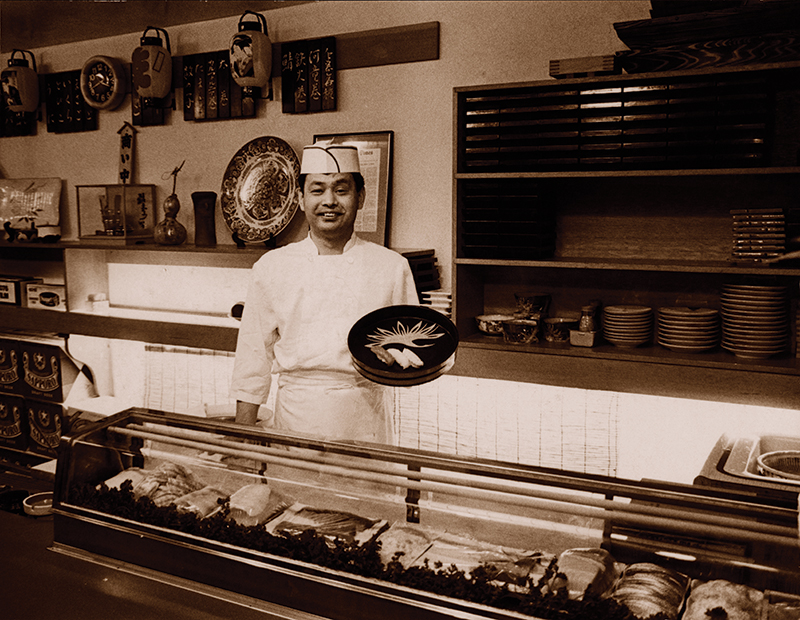
Photo credit: Sushi Nozawa LLC
ROLLING WITH IT
Despite his reputation, Nozawa has always seen himself as a family man, saying one of his biggest blessings in running his eatery was being able to share it with his wife. “I was lucky that during my years manning the bar at Sushi Nozawa, my wife was by my side. I believe that I’ve spent many more hours with my wife than most people have, and for me that’s good fortune.”
And now he is also spending a great deal of time with his son, Tom. The two, along with several partners, have formed the restaurant group Sushi Nozawa LLC. It includes the growing Sugarfish chain (eight locations in all, including one in Studio City), KazuNori, The Original Hand Roll Bar in Downtown LA and Nozawa Bar in Beverly Hills. Although Nozawa no longer works behind the counter, he still frequents fish markets to select fish and helps train the chefs.
The three restaurants offer different dining experiences. Sugarfish doesn’t have a sushi bar. Instead the eatery has a corporate vibe with casual, full-service variations of “Trust Me” meals, as well as a small a la carte menu. Nozawa Bar is a fine-dining, 10-seat, omakase-only sushi bar aimed at the more adventurous eater. KazuNori is a casual sushi bar that specializes in made-to-order hand rolls based on original Sushi Nozawa recipes, including his infamous original blue crab.
Nozawa realizes the indelible legacy he has left on the Valley and, ultimately, on the art of sushi-making. “I’ve never wavered from my dedication to serving my style of traditional sushi in hopes of educating the consumers in this country about sushi. All of that dedication has made a difference. I know that when I see people, young and old, eating my style of sushi—and eating things like uni, amaebi, ikura, engawa—things that nobody in this country was eating when I started here.”
As for his critics, the feisty chef is surprisingly contemplative. “It seems that they are as passionate about what they do as I am about what I do. I admire that. If I had listened many years ago to the people who disagreed with me, I would never have opened Sushi Nozawa and my life would have taken a very different course.
As far as their opinions, all people have their opinions. I cannot concern myself about that. I need to stay true to what I believe, and the rest takes care of itself.”
Another revelation: The immigrant chef who stuck to his guns and defied the odds by building a sushi empire actually had another dream. He originally aspired to be a professional baseball player. “I played as a young man, but when I didn’t make the cut for the professional draft, I turned to sushi. I suppose it was meant to be.”





